The Russian economy has contracted for the first time in five years after falling oil prices and sanctions imposed by western governments began to take their toll.
The prospects for the country’s economy are expected to remain weak after President Vladimir Putin’s government revealed that GDP in November was 0.5% lower than in the same month a year ago.
It is the first time since October 2009 that the Russian economy has shrunk and comes at a time when the rouble has been collapsing on foreign exchange markets after a near halving of the oil price since June.
Manufacturing, construction, agriculture and service sectors all contracted in November, although energy, mining and the retail trade showed continued growth.
Economists are warning that Russia – one of the world’s biggest energy exporters – could be facing its first recession in five years. The central bank fears the economy could shrink by up to 4.8% next year if oil prices fail to recover from five-year lows.
The repercussions are starting to be felt. A week ago Russia’s central bank threw a £340m lifeline to Trust Bank – a Moscow bank that uses the Hollywood star Bruce Willis to advertise its credit cards – and the government has agreed to a 1tn-rouble recapitalisation of the nation’s banks.
The guarantee on bank account deposits has also been raised to try to quell people’s concerns about the safety of their savings.
The fail in the oil price comes at a time when western sanctions imposed over Russia’s backing for separatists in Ukraine are making it tough for the country’s banks to raise finance in the international money markets, leading to billions of dollars being withdrawn from the country.
The GDP data was said to be the first signal that further contraction in the economy is likely. “This is the beginning of a recession,” Ruslan Grinberg, director of the Institute of Economics at the Russian Academy of Sciences, told the AFP news agency.
Dmitry Polevoy, the chief economist for Russia and the Commonwealth of Independent States at ING Bank in Moscow, told Reuters that things would get worse with oil prices at their current levels.
“There is no cause for optimism,” Polevoy said. “This is linked to sanctions first of all, oil and the panic we saw on the market in December.
“The damage to the banking system and consumer sentiment will take a long time to repair.”
Oil prices have fallen after the oil producing cartel Opec refused to cut production to shore up the price, which has slipped below $60 a barrel from its recent high of $115. Oil and gas account for 70% of Russia’s exports and Moscow needs an oil price in the region of $100 a barrel to balance its budget.
This dependency on oil has led to a rout of the rouble on the foreign exchange markets, prompting an emergency rise in interest rates to 17% from 12.5% earlier this month. As a result, the currency has recouped some of the ground lost against the dollar - where it was trading at historic lows earlier this month – although it slipped back yesterday after the data was released.
Mark Carney, the governor of the Bank of England, has said that the failing oil price should help fuel economic growth – the price of petrol has been falling at pumps and inflation in the UK is running at its lowest level for 12 years. But he has given a warning too about the risks caused by rising geopolitical tensions.
The Bank of England has also said that failing oil prices could have repercussions for shale oil developers in the US making payments on their debts.
“A sustained lower oil price also has the potential to reinforce certain geopolitical risks,” the Bank of England said earlier this month.
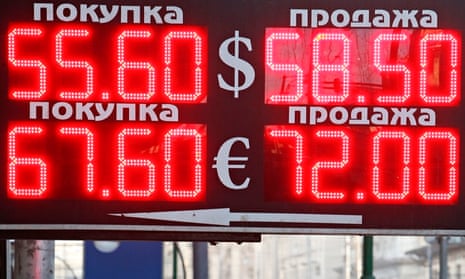


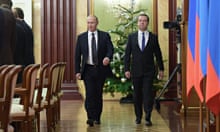
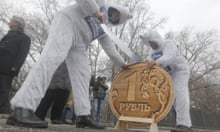
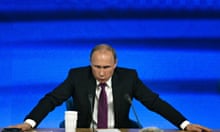
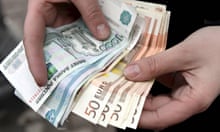
Comments (…)
Sign in or create your Guardian account to join the discussion